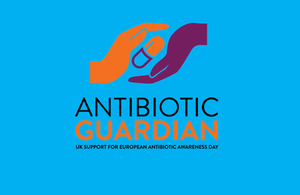Make your pledge today and join over 17,000 Antibiotic Guardians
PHE calls on the public, healthcare professionals and students to join the fight against resistance and become Antibiotic Guardians.

Antibiotic Guardian, a campaign led by Public Health England (PHE), urges members of the public and healthcare professionals to take action in helping to slow antibiotic resistance and ensure our antibiotics work now and in the future.
To become an Antibiotic Guardian, people choose one pledge about how they can personally prevent infections and make better use of antibiotics and help protect these vital medicines.
In support of European Antibiotic Awareness Day (EAAD) and the newly announced World Antibiotic Awareness Week (WAAW), PHE are encouraging people to join over 17,000 Antibiotic Guardians, taking a personal action to fight antibiotic resistance.
Some pledges that members of the public can choose in becoming Antibiotic Guardians include:
- if the NHS offers me a flu vaccination, I pledge to accept
- if I’m prescribed antibiotics, I will take them exactly as prescribed and never share them with others
- when I think my child has a likely respiratory infection, I pledge to talk to my pharmacist about how to treat my child’s symptoms first rather than going to the GP
- I will wash my hands after sneezing or coughing to reduce the transmission of infection
Raising awareness of antibiotic resistance is closely linked to this year’s Stay Well This Winter campaign, which gives the public advice on how to look after themselves during the winter period.
One of the main campaign messages is encouraging uptake of the flu jab in at-risk groups; getting vaccinated will reduce the likelihood of these people becoming ill, which could lead to antibiotics being requested inappropriately. Other messages include reminding the public to seek health advice from community pharmacists and to always take prescribed medicines as directed; these are also vital as part of efforts to combat resistance.
Dr Diane Ashiru-Oredope, Pharmacist Lead for the Antimicrobial Resistance programme at PHE and lead for the Antibiotic Guardian campaign, said:
Everyone can play a part in tackling antibiotic resistance; we often hear about the problem of these vital drugs becoming ineffective, but not about what actions individuals can take to help – this is exactly what the Antibiotic Guardian campaign provides.
By making just one pledge, whether that is not expecting an antibiotic for a self-limiting illness, taking up the offer of a free flu jab or ensuring the responsible use of all antibiotics, we can fight resistance together.
In addition to Antibiotic Guardian, I’d like to remind the public this winter to make the most of community pharmacists and their teams. Pharmacists can play a vital role in helping to manage patient’s expectations, explaining the normal duration of winter illnesses caused by viruses, what warning signs to look out for and can provide effective over the counter treatments to help relieve symptoms.
Antibiotic resistance is one the biggest threats to public health and PHE is responsible for delivering 4 key aspects of the 5-year UK strategy to help combat antibiotic resistance. These are improving infection prevention and control practices to reduce the number of infections in patients; optimising prescribing practice, improving professional education, training and public engagement and enabling better access to and use of surveillance data.
Dr Mike Durkin, NHS England Director of Patient Safety, said:
Antimicrobial resistance is a major threat to the delivery of healthcare across the globe. We need to act now to make sure we behave as responsible stewards of the use of antimicrobial medications, so that these incredible elements of medical science can be preserved – not just for our lifetime but for all future generations. I am extremely proud to support both European Antibiotic Awareness Day and the first World Antibiotic Awareness Week – these campaigns highlight the need for global action, and as one of the largest healthcare providers in the world it is vital the NHS is seen to lead that fight.
I have made my own personal pledge to the Antibiotic Guardian campaign which is ‘to work to contribute to develop a national action plan for my country on antimicrobial resistance in line with the global plan’.
Background information
Will you become an Antibiotic Guardian? Will you become an Antibiotic Guardian?
Public Health England exists to protect and improve the nation’s health and wellbeing, and reduce health inequalities. It does this through world-class science, knowledge and intelligence, advocacy, partnerships and the delivery of specialist public health services. PHE is an operationally autonomous executive agency of the Department of Health. Follow us on Twitter: @PHE_uk and Facebook: www.facebook.com/PublicHealthEngland.
Antibiotic Guardian is a One Health campaign and has been developed by PHE in collaboration with Department of Health’s Expert Advisory Committee on Antimicrobial Resistance and Healthcare Associated Infections (ARHAI); the Department for Environment Food and Rural Affairs (DEFRA), the Devolved Administrations and professional bodies or organisations towards the ‘One Health’ initiative.
Antibiotic Guardian is an ongoing campaign and was first developed in 2014. You can pledge to become an Antibiotic Guardian on the website.
The 5-year cross-government Antimicrobial Resistance Strategy is available online.
PHE are aiming to reach 100,000 Antibiotic Guardians by March 2016.
Flu and antimicrobial resistance: patients often expect antibiotics to treat common flu symptoms such as coughs and runny noses. While some infections that cause these symptoms are bacterial, flu is caused by influenza viruses, which do not respond to antibiotics. By preventing flu and its symptoms, the chance that antibiotics will be unnecessarily prescribed is reduced.
Preventing influenza can also help prevent pneumonia (both bacterial and viral) that occurs as a secondary infection following influenza. Secondary bacterial co-infections are a major cause of death, and require antibiotic treatment. The risk of influenza-associated pneumonia has also been shown to be lower in those vaccinated against influenza.
PHE’s English surveillance programme for antimicrobial utilisation and resistance (ESPAUR) report shows reduced S. pneumoniae bloodstream infections between 2010 and 2014; this may be related to increased pneumococcal vaccination rates.